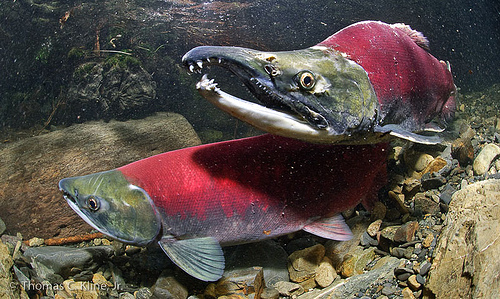Hard choices have to be made in the US very soon: is it the gold in the ground or gold in another form in the waters?

Scenario A: Tens of millions of salmon surge through the state of Alaska’s Bristol Bay and about half the amount are caught to feed half of the world’s demand.
Scenario B: Near the headwaters of the bay, mining company, Northern Dynasty, has discovered what is potentially the biggest gold and copper mine in the world.
If the mine is dug, critics warn the side effects could be devastating: poisoning the salmon, acres of wetlands, lakes and ponds, as well grinding the economy of the Bay to a halt.
The Pebble Mine development stalled under President Barack Obama, but President Donald Trump appears to have given the controversial project a new lease of life.
Critics of the Pebble Mine worry that acid could get into the watershed, destroying one of the last great salmon runs left on the planet.
The developers of Pebble Mine insist that they can pull the gold and copper out safely, but fishermen, conservationists, biologists and most native tribes disagree.
Conservation group, the WWF, has joined in the campaign against the project. The group expresses the concern that the US Congress is considering legislation that would eliminate Endangered Species Act protections for foreign species like tigers, rhinos and elephants. It fears that the legislation could damage the US’ ability to curb illegal wildlife trade.
WWF states: “Bristol Bay is a place of stunning natural beauty, abundant wildlife, millions of salmon, and the place of the strongest commercial sockeye salmon runs in the world. It is a national treasure on a global scale.
“Earlier this year, US Environmental Protection Agency (EPA) under President Trump took a big step backwards to reverse the EPA’s scientifically-based proposed protections for Bristol Bay, Alaska. These proposed protections the EPA itself concluded are necessary to protect Bristol Bay and its fish and wildlife from the proposed Pebble Mine.
“The EPA wants to reverse course on its protections, risking the health of Bristol Bay. We need to keep those proposed protections in place to protect Bristol Bay from the proposed Pebble Mine.”
In a petition which WWF is seeking about 150,000 supporters to endorse, the group is asking Edward Scott Pruitt, the EPA administrator, and the Trump administration not to pave the way for the Pebble Mine.
The petition reads:
Dear Administrator Pruitt and Acting Region 10 Administrator Pirzadeh:
I am writing today to encourage the US Environmental Protection Agency (EPA) to protect Bristol Bay, Alaska, from the proposed Pebble Mine that would threaten the region’s irreplaceable fish and wildlife resources and the 14,000 jobs that depend on Bristol Bay’s clean, healthy waters. EPA must keep the Bristol Bay 404(c) Proposed Determination in place to protect Bristol Bay, its salmon, waters, people, and sustainable economy from the proposed Pebble Mine.
EPA’s own scientific study contains highly concerning facts: even without a mine disaster, construction of the Pebble deposit will destroy 94 miles of salmon streams and 5,350 acres of wetlands, lakes and ponds. Overall, EPA concluded that mining the headwaters of the Bristol Bay river systems could cause irreparable harm to the valuable Bristol Bay fishery, wildlife, and people.
According to the EPA’s own study, the Bristol Bay watershed provides vital habitat for 29 fish species, more than 190 bird species, and more than 40 terrestrial animals. All five species of Pacific salmon – sockeye, Chinook, coho, chum and pink – spawn and rear in the pristine Bristol Bay watershed. The Bristol Bay watershed supports the largest sockeye salmon run in the world, producing approximately 46% of the world’s wild sockeye harvest, creating $1.5 billion in economic output and nearly 20,000 jobs throughout the United States annually.
Because of its great ecological and economic value, I recommend the EPA keep in place the 404(c) Proposed Determination for Bristol Bay, Southwest Alaska. The reasonable restrictions included in that proposal will prevent unsustainable development that would adversely impact the region’s fishery, recreation and local culture.
Please keep the agency’s 404(c) action in place to protect one of the nation’s greatest sustainable resources – the Bristol Bay, Alaska, salmon fishery.
Sincerely,
